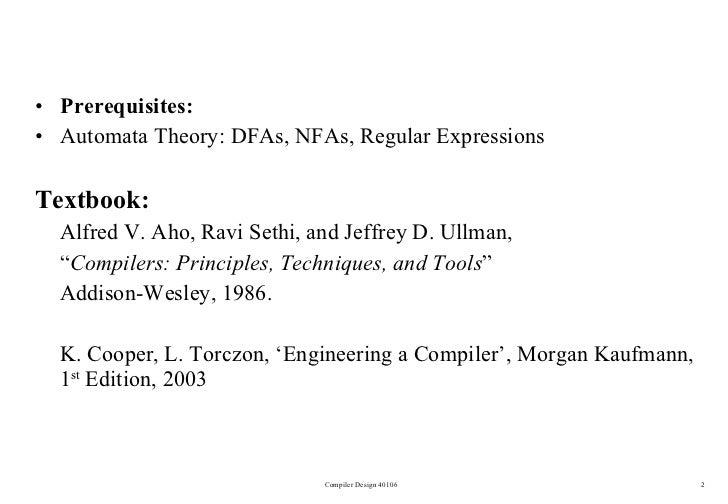Principles Compiler Design Alfred V Aho Jeffrey D Ullman Pdf Reader

This book provides the foundation for understanding the theory and pracitce of compilers. Revised and updated, it reflects the current state of compilation. Every chapter has been completely revised to reflect developments in software engineering, programming languages, and computer architecture that have occurred since 1986, when the last edition published.& The authors, recognizing that few readers will ever go on to construct a compiler, retain their focus on the broader set of problems faced in software design and software development.  Computer scientists, developers, & and aspiring students that want to learn how to build, maintain, and execute a compiler for a major programming language. Ravi Sethi, director of Computing Science Research, has been at AT&T Bell Laboratories in Murray Hill, New Jersey since 1976.
Computer scientists, developers, & and aspiring students that want to learn how to build, maintain, and execute a compiler for a major programming language. Ravi Sethi, director of Computing Science Research, has been at AT&T Bell Laboratories in Murray Hill, New Jersey since 1976.
Nov 1, 2018 - GMT compiler design alfred v aho pdf - Alfred V. Aho Columbia. 06:09:00 GMT Principles of Compiler Design -A.v. Jeffrey D Ullman. Principles of. Readers will ever go on to construct a. CS4XX‐INTRODUTION TO COMPILER THEORY. CS4XX - WEEK 6. Reading: Chapter 6 from Principles of Compiler Design, Alfred V. Aho & Jeffrey D Ullman.
He has held teaching positions at Pennsylvania State university and the University of Arizona, and has taught at Princeton University and Rutgers. Driver asus x52de. Sethi is co-author of the 'dragon book', Compilers: Principles, Techniques and Tools and has written numerous articles. His books have been translated in Japanese, German, French, Italian, Spanish, and Korean.
This introduction to compilers is the direct descendant of the well-known book by Aho and Ullman, Principles of Compiler Design. The authors present updated coverage of compilers based on research and techniques that have been developed in the field over the past few years. The book provides a thorough introduction to compiler design and covers topics such as context-free This introduction to compilers is the direct descendant of the well-known book by Aho and Ullman, Principles of Compiler Design. The authors present updated coverage of compilers based on research and techniques that have been developed in the field over the past few years. The book provides a thorough introduction to compiler design and covers topics such as context-free grammars, fine state machines, and syntax-directed translation.

There are certain books that everyone (in a relevant technical field) knows. Baby Rudin, CLR, Patterson-Hennessy, Golub and Van Loan, and Kernighan and Ritchie are all fine examples. The Dragon Book is another fine example, despite this odd reputation it has for being too dryly theoretical. We used it when I took compilers, and I've used it as a reference for myself when working on or teaching about compilers and interpreters. When I taught compilers, we used Appel's Modern Compiler Implementati There are certain books that everyone (in a relevant technical field) knows. Baby Rudin, CLR, Patterson-Hennessy, Golub and Van Loan, and Kernighan and Ritchie are all fine examples.
The Dragon Book is another fine example, despite this odd reputation it has for being too dryly theoretical. We used it when I took compilers, and I've used it as a reference for myself when working on or teaching about compilers and interpreters. When I taught compilers, we used Appel's Modern Compiler Implementation in Java, which I didn't like nearly as well. A classic but now bit dated but the basics in this field haven't changed much. I would speculate not knowing too much yet about certain aspects of modern compiler design research yet that one would have to in order to get a full picture look at recent PLDI and POPL proceedings.
I find the text compared to say Sipser for example lacking in clarity in terms of presentation which is why I took off a star. It's a bit too note like and driven by examples as opposed to consisting of well structured ex A classic but now bit dated but the basics in this field haven't changed much. I would speculate not knowing too much yet about certain aspects of modern compiler design research yet that one would have to in order to get a full picture look at recent PLDI and POPL proceedings. I find the text compared to say Sipser for example lacking in clarity in terms of presentation which is why I took off a star. It's a bit too note like and driven by examples as opposed to consisting of well structured expository writing in some places. Overall the best there is though at present. This book can be a bit esoteric and hard to understand.
There are several other books that go into greater detail that can help fill in the gaps that are left out of this book. I wouldn't read this book by itself to gain enough knowledge to really grasp the subject. As well, there are many good open source compilers I would recommend anyone download and examine to understand how a compiler works in this modern age.